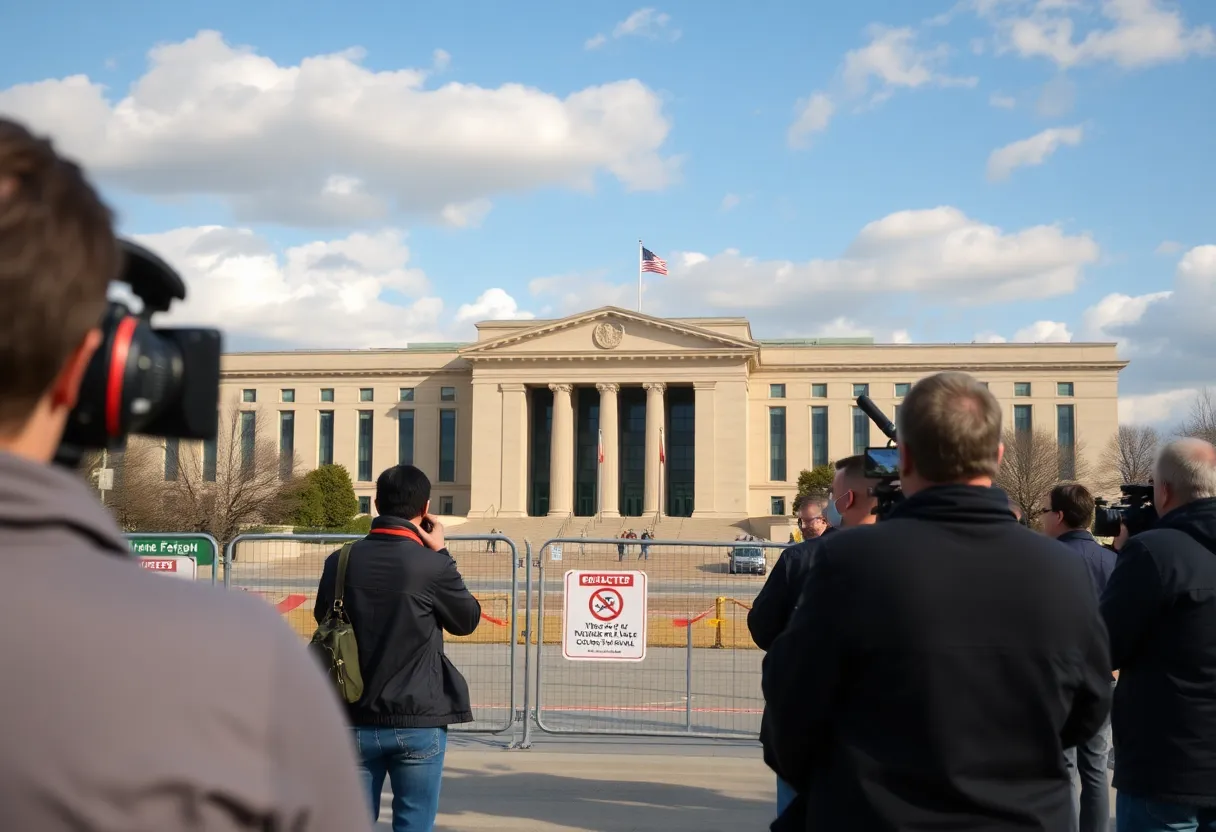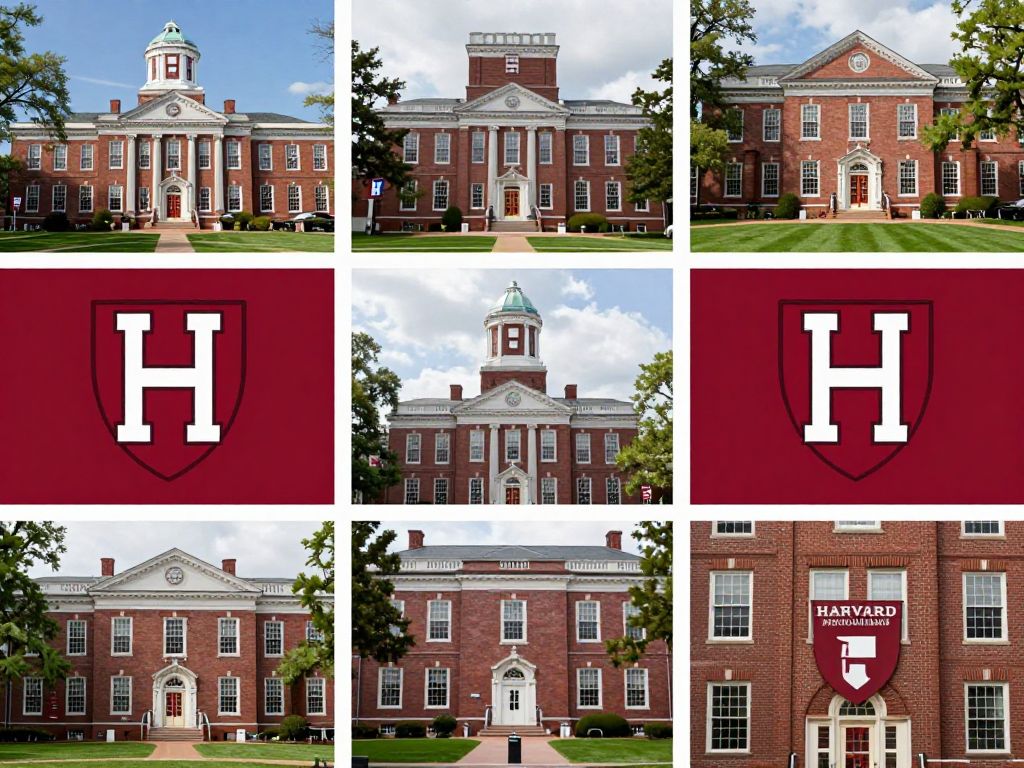Arlington, Va., September 21, 2025
News Summary
The Pentagon has announced a new policy requiring credentialed journalists to sign a pledge that restricts reporting on unauthorized information, including unclassified details. A memo detailing these media restrictions was released, mandating prior approval from authorized officials for any public disclosures. Critics have condemned the policy as detrimental to press freedoms, arguing it undermines independent journalism and transparency. The directive formalizes past practices and introduces security measures, including limitations on journalist movement within the Pentagon. Supporters claim these steps are necessary to protect sensitive information and operations.
Arlington, Va.
The Pentagon will require credentialed journalists to sign a pledge that prohibits reporting on unauthorized information, including unclassified information. A 17-page memo outlining these new media restrictions was distributed by the Pentagon on Friday. The policy mandates that information must receive approval for public release from an authorized official before it can be publicly disclosed. Failure to comply with this policy may result in the loss of press credentials, which provide access to the Pentagon.
What the policy requires
The signature form for journalists includes various security requirements. The restrictions require journalists to avoid unauthorized access and disclosure of classified or controlled unclassified information. The memo formalizes previous directives and includes a detailed map of restricted areas within the Pentagon. The Pentagon Press Association Board is currently reviewing the new directive.
Immediate effects and enforcement
This year, the Pentagon has already evicted several news organizations and imposed substantial restrictions on press access. Journalists now face limited movement within the Pentagon, requiring a government escort in several areas previously accessible. Defense Secretary Pete Hegseth emphasized the restrictions on social media, stating that the press must adhere to rules or face removal.
Reactions and concerns
Advocates for press freedoms criticized the non-disclosure requirement, labeling it an assault on independent journalism. The Society of Professional Journalists labeled the new policy as alarming, associating it with prior restraint on press freedom. National Press Club President Mike Balsamo expressed alarm, stating that if military news is government-approved, it compromises independent reporting. Matt Murray, executive editor of The Washington Post, contended that the new policy undermines the Constitution and the public’s right to oversee government actions.
Pentagon spokesperson Sean Parnell defended the guidelines, claiming they align with practices at military bases across the U.S. and serve to protect sensitive information. Criticism has been voiced regarding the government’s growing hostility toward transparency and democratic norms.
Context and recent incidents
The new restrictions coincide with President Donald Trump’s administration increasing threats, lawsuits, and government pressure on media. Early in Hegseth’s tenure, an embarrassing incident occurred where the editor of The Atlantic was inadvertently included in a sensitive group chat regarding military plans. Hegseth suspended two Pentagon officials following a leak regarding Elon Musk receiving a briefing on potential military responses to a conflict with China.
Why officials say change was needed
Officials describe the memorandum and its signature form as formalizing steps already taken in some areas and as a response to risks tied to the disclosure of sensitive information. The Pentagon says the guidance is intended to protect operations, personnel, and classified or controlled unclassified information, while setting clear boundaries for credentialed press access and behavior inside the facility.
Next steps
The Pentagon Press Association Board is reviewing the directive as media organizations, press freedom advocates, and defense officials weigh the practical implications. The review will affect how credentialing, access, and enforcement are applied in coming weeks and months.
FAQ
What will the Pentagon require from journalists?
The Pentagon will require credentialed journalists to sign a pledge that prohibits reporting on unauthorized information, including unclassified information.
How was the policy communicated?
A 17-page memo outlining these new media restrictions was distributed by the Pentagon on Friday.
Does all information need approval before release?
The policy mandates that information must receive approval for public release from an authorized official before it can be publicly disclosed.
What happens if a journalist does not comply?
Failure to comply with this policy may result in the loss of press credentials, which provide access to the Pentagon.
What does the signature form include?
The signature form for journalists includes various security requirements.
How have press freedom groups reacted?
Advocates for press freedoms criticized the non-disclosure requirement, labeling it an assault on independent journalism.
Does this relate to broader government actions?
The new restrictions coincide with President Donald Trump’s administration increasing threats, lawsuits, and government pressure on media.
What did the National Press Club say?
National Press Club President Mike Balsamo expressed alarm, stating that if military news is government-approved, it compromises independent reporting.
What did defense leadership emphasize?
Defense Secretary Pete Hegseth emphasized the restrictions on social media, stating that the press must adhere to rules or face removal.
Have there been recent access changes at the Pentagon?
This year, the Pentagon has already evicted several news organizations and imposed substantial restrictions on press access.
Are there new movement limits inside the building?
Journalists now face limited movement within the Pentagon, requiring a government escort in several areas previously accessible.
Were there any notable incidents that influenced policy?
Early in Hegseth’s tenure, an embarrassing incident occurred where the editor of The Atlantic was inadvertently included in a sensitive group chat regarding military plans.
Were officials disciplined over leaks?
Hegseth suspended two Pentagon officials following a leak regarding Elon Musk receiving a briefing on potential military responses to a conflict with China.
How did professional journalism organizations react?
The Society of Professional Journalists labeled the new policy as alarming, associating it with prior restraint on press freedom.
What did a major newspaper editor say about the policy?
Matt Murray, executive editor of The Washington Post, contended that the new policy undermines the Constitution and the public’s right to oversee government actions.
How did the Pentagon defend the policy?
Pentagon spokesperson Sean Parnell defended the guidelines, claiming they align with practices at military bases across the U.S. and serve to protect sensitive information.
What specific information does the policy seek to protect?
The restrictions require journalists to avoid unauthorized access and disclosure of classified or controlled unclassified information.
Does the memo include maps or logistical details?
The memo formalizes previous directives and includes a detailed map of restricted areas within the Pentagon.
Who is reviewing the directive?
The Pentagon Press Association Board is currently reviewing the new directive.
What broader criticism has been raised?
Criticism has been voiced regarding the government’s growing hostility toward transparency and democratic norms.
{
“@context”: “https://schema.org”,
“@type”: “FAQPage”,
“mainEntity”: [
{
“@type”: “Question”,
“name”: “What will the Pentagon require from journalists?”,
“acceptedAnswer”: {
“@type”: “Answer”,
“text”: “The Pentagon will require credentialed journalists to sign a pledge that prohibits reporting on unauthorized information, including unclassified information.”
}
},
{
“@type”: “Question”,
“name”: “How was the policy communicated?”,
“acceptedAnswer”: {
“@type”: “Answer”,
“text”: “A 17-page memo outlining these new media restrictions was distributed by the Pentagon on Friday.”
}
},
{
“@type”: “Question”,
“name”: “Does all information need approval before release?”,
“acceptedAnswer”: {
“@type”: “Answer”,
“text”: “The policy mandates that information must receive approval for public release from an authorized official before it can be publicly disclosed.”
}
},
{
“@type”: “Question”,
“name”: “What happens if a journalist does not comply?”,
“acceptedAnswer”: {
“@type”: “Answer”,
“text”: “Failure to comply with this policy may result in the loss of press credentials, which provide access to the Pentagon.”
}
},
{
“@type”: “Question”,
“name”: “What does the signature form include?”,
“acceptedAnswer”: {
“@type”: “Answer”,
“text”: “The signature form for journalists includes various security requirements.”
}
},
{
“@type”: “Question”,
“name”: “How have press freedom groups reacted?”,
“acceptedAnswer”: {
“@type”: “Answer”,
“text”: “Advocates for press freedoms criticized the non-disclosure requirement, labeling it an assault on independent journalism.”
}
},
{
“@type”: “Question”,
“name”: “Does this relate to broader government actions?”,
“acceptedAnswer”: {
“@type”: “Answer”,
“text”: “The new restrictions coincide with President Donald Trump’s administration increasing threats, lawsuits, and government pressure on media.”
}
},
{
“@type”: “Question”,
“name”: “What did the National Press Club say?”,
“acceptedAnswer”: {
“@type”: “Answer”,
“text”: “National Press Club President Mike Balsamo expressed alarm, stating that if military news is government-approved, it compromises independent reporting.”
}
},
{
“@type”: “Question”,
“name”: “What did defense leadership emphasize?”,
“acceptedAnswer”: {
“@type”: “Answer”,
“text”: “Defense Secretary Pete Hegseth emphasized the restrictions on social media, stating that the press must adhere to rules or face removal.”
}
},
{
“@type”: “Question”,
“name”: “Have there been recent access changes at the Pentagon?”,
“acceptedAnswer”: {
“@type”: “Answer”,
“text”: “This year, the Pentagon has already evicted several news organizations and imposed substantial restrictions on press access.”
}
},
{
“@type”: “Question”,
“name”: “Are there new movement limits inside the building?”,
“acceptedAnswer”: {
“@type”: “Answer”,
“text”: “Journalists now face limited movement within the Pentagon, requiring a government escort in several areas previously accessible.”
}
},
{
“@type”: “Question”,
“name”: “Were there any notable incidents that influenced policy?”,
“acceptedAnswer”: {
“@type”: “Answer”,
“text”: “Early in Hegseth’s tenure, an embarrassing incident occurred where the editor of The Atlantic was inadvertently included in a sensitive group chat regarding military plans.”
}
},
{
“@type”: “Question”,
“name”: “Were officials disciplined over leaks?”,
“acceptedAnswer”: {
“@type”: “Answer”,
“text”: “Hegseth suspended two Pentagon officials following a leak regarding Elon Musk receiving a briefing on potential military responses to a conflict with China.”
}
},
{
“@type”: “Question”,
“name”: “How did professional journalism organizations react?”,
“acceptedAnswer”: {
“@type”: “Answer”,
“text”: “The Society of Professional Journalists labeled the new policy as alarming, associating it with prior restraint on press freedom.”
}
},
{
“@type”: “Question”,
“name”: “What did a major newspaper editor say about the policy?”,
“acceptedAnswer”: {
“@type”: “Answer”,
“text”: “Matt Murray, executive editor of The Washington Post, contended that the new policy undermines the Constitution and the public’s right to oversee government actions.”
}
},
{
“@type”: “Question”,
“name”: “How did the Pentagon defend the policy?”,
“acceptedAnswer”: {
“@type”: “Answer”,
“text”: “Pentagon spokesperson Sean Parnell defended the guidelines, claiming they align with practices at military bases across the U.S. and serve to protect sensitive information.”
}
},
{
“@type”: “Question”,
“name”: “What specific information does the policy seek to protect?”,
“acceptedAnswer”: {
“@type”: “Answer”,
“text”: “The restrictions require journalists to avoid unauthorized access and disclosure of classified or controlled unclassified information.”
}
},
{
“@type”: “Question”,
“name”: “Does the memo include maps or logistical details?”,
“acceptedAnswer”: {
“@type”: “Answer”,
“text”: “The memo formalizes previous directives and includes a detailed map of restricted areas within the Pentagon.”
}
},
{
“@type”: “Question”,
“name”: “Who is reviewing the directive?”,
“acceptedAnswer”: {
“@type”: “Answer”,
“text”: “The Pentagon Press Association Board is currently reviewing the new directive.”
}
},
{
“@type”: “Question”,
“name”: “What broader criticism has been raised?”,
“acceptedAnswer”: {
“@type”: “Answer”,
“text”: “Criticism has been voiced regarding the government’s growing hostility toward transparency and democratic norms.”
}
}
]
}
Quick Reference Table
| Topic | Detail |
|---|---|
| Policy document | 17-page memo outlining new media restrictions |
| Required action | Credentialed journalists must sign a pledge limiting reporting on unauthorized information |
| Approval process | Information must receive approval for public release from an authorized official |
| Consequences | Loss of press credentials may result from non-compliance |
| Movement | Limited movement; government escort required in several previously accessible areas |
| Review | Pentagon Press Association Board is reviewing the directive |
| Public criticism | Advocates and journalism organizations described the policy as alarming and an assault on independent journalism |
Deeper Dive: News & Info About This Topic
HERE Resources
Additional Resources
- The Guardian
- New York Times
- AP News
- CBS News
- ABC News
- Wikipedia: Freedom of the Press in the United States
- Google Search: Pentagon Journalism Restrictions
- Google Scholar: Pentagon Media Restrictions
- Encyclopedia Britannica: Freedom of Speech
- Google News: Pentagon Press Restrictions

Author: STAFF HERE BOSTON WRITER
The BOSTON STAFF WRITER represents the experienced team at HEREBoston.com, your go-to source for actionable local news and information in Boston, Suffolk County, and beyond. Specializing in "news you can use," we cover essential topics like product reviews for personal and business needs, local business directories, politics, real estate trends, neighborhood insights, and state news affecting the area—with deep expertise drawn from years of dedicated reporting and strong community input, including local press releases and business updates. We deliver top reporting on high-value events such as Boston Marathon, Head of the Charles Regatta, and Boston Harborfest. Our coverage extends to key organizations like the Greater Boston Chamber of Commerce and Associated Industries of Massachusetts, plus leading businesses in finance, biotech, and insurance that power the local economy such as Fidelity Investments, Biogen, and Liberty Mutual Insurance. As part of the broader HERE network, we provide comprehensive, credible insights into Massachusetts's dynamic landscape.





